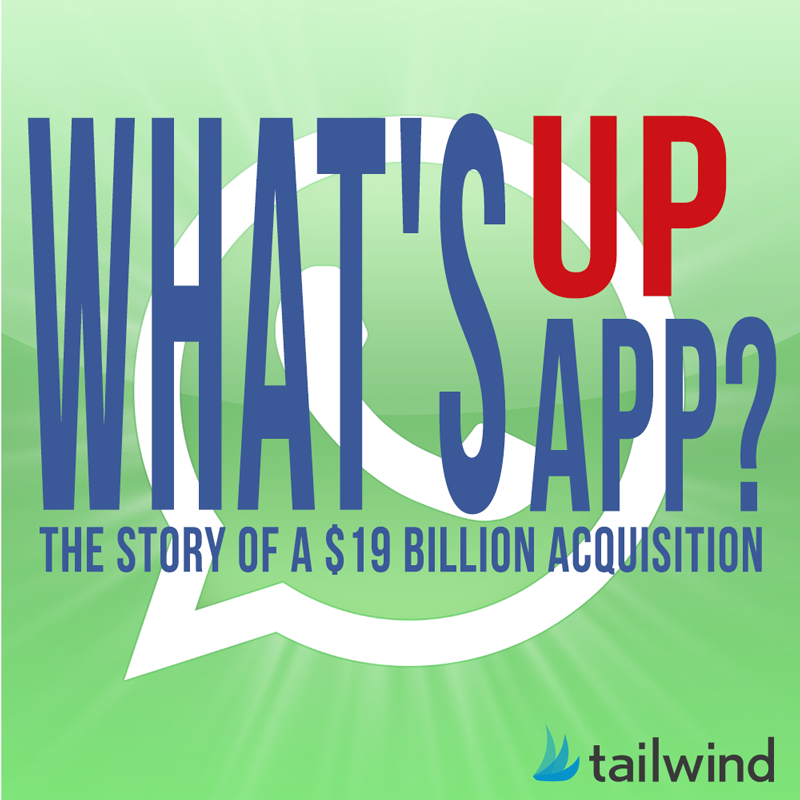Tailwind is no stranger to acquisitions. Just last year we acquired PinReach. But we’re a bit astonished at Facebook’s recent $19 billion acquisition of WhatsApp. We decided to dig around a bit to see if we can solve the mystery behind this earth-shattering acquisition.

Let’s be honest—When Facebook announced it would buy WhatsApp for a staggering $19 billion, people went crazy. It’s no surprise, considering you can get a lot with $19 billion. Things that, on the surface, seem far more valuable than a small company with just 55 employees and 2013 revenues of only $20 million. So what’s the reason behind this? Keep reading to learn why this choice may not be a huge mistake, even though it is definitely daring.
1. Untapped Potential
WhatsApp’s main source of income is a $1 subscription fee after one year of use. Even though Facebook has decided to allow WhatsApp to remain independent, it is likely that additional monetization methods will come into play. Although the founders of WhatsApp have made clear their disdain for in-app advertisements (they don’t even have a marketing department), perhaps the service will take a note from WeChat and add in-app purchases such as games and stickers. WeChat, for those that don’t already know, is the leading messenger app in China with over 300,000 users worldwide. Although, according to Chinese news website Xinhua, users amount to something closer to 600,000. Regardless, it’s a lot of people. If Facebook can find the right way to monetize the platform (as they did with Facebook itself after a few years of research) there is definitely potential for some serious cash. Just for the sake of comparison, (although the two apps are radically different in both user-base and monetization methods) just look at WeChat, which is estimated to earn $1.1 billion this year.
2. Global Reach and Relevance
WhatsApp has an incredible adoption rate. As 2013 drew to a close, 25 million unique users were signing up each month. Almost 1 million users PER DAY. That’s not to mention the 450 million users that were already logging on each day. But that’s not even the best part. These users come from countries all over the world, many of which are developing countries that show slow adoption of Facebook. The acquisition allows Facebook to remain relevant in those countries. Additionally, the move helps Facebook deal with the general shift away from laptops towards mobile devices. Some would even go so far to say that, in order to remain competitive on the mobile front abroad, Facebook had no choice but to acquire WhatsApp, regardless of price.
3. People generally don’t appreciate being advertised to
It’s true. When I’m playing an epic round of Flappy Bird and a flashy banner ad pops up, ruining my concentration and causing my adorable avian friend to slam into a green pipe, I’m not a happy camper. This is why ad-blocking software is so popular. We’ve seen it on all major social media platforms, and it’s the same thing on mobile- marketers have to find a way to monetize without being ‘in your face’ about it. On Pinterest, we have to form our profiles in accordance with what the followers want, not with what we want them to want. The anti-advertising stance of WhatsApp’s creators means that they will continue to innovate in a way that doesn’t rely on ads. Zuckerberg even said “I don’t personally think ads are the right way to monetize messaging.” So essentially, acquiring WhatsApp allows Facebook to get around the mobile advertising problem with a team that is practically founded on a their disdain for it.
4. Cheap to Maintain
As we said before, WhatsApp only has 55 employees. At first glance this may seem like an incredibly small amount of people, certainly not worth forking over $19 billion for. However, this tiny group of people is managing to successfully cater to a user base of over 450 million. As Henry Blodget noted at Business Insider, “assuming an all-in cost of $200,000 per employee, that’s a total cost base of $11 million. [Assuming] WhatsApp grows to …300 employees over the next few years… it will have a cost base of only $50-$75 million.” He goes on to note that if the company manages to continue its insane growth, “it could easily be pulling in more than $1 billion a year of revenue in a few years. Almost all of that would be profit.” There are no marketing costs to configure either, considering the WhatsApp creators are happy to just let the app sell itself.
So that about sums it up. It looks like Zuckerberg might not be quite as insane(or inept, depending on who you ask) as many pundits would have us believe. But will the popular messaging app really be able to recoup $19 billion in revenue? Only time will tell.